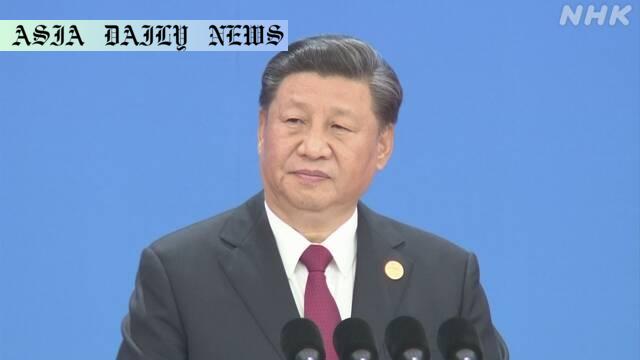Trade ties: Xi Jinping pushes for closer economic collaboration with Germany and France amid trade friction with the US.
China aims to deepen trade ties with Germany and France amid US trade friction.
Xi Jinping focuses on AI, climate change, and multilateral cooperation.
Beijing strengthens relations with the EU and ASEAN for economic dominance.

China’s Strategic Pivot in Trade Relations
Chinese President Xi Jinping is reshaping the nation’s trade policy in light of mounting tensions with the United States. While recent talks with the U.S. bring the possibility of reduced tariffs, China’s enduring friction with its largest trading partner has motivated it to explore and develop stronger alliances elsewhere. In this context, Europe—represented by economic powerhouses Germany and France—has emerged as a critical partner in Beijing’s strategy to rebalance trade priorities.
Expanding Trade Cooperation with Germany
President Xi recently held discussions with German Chancellor Friedrich Merz. This marked the beginning of a pivotal diplomatic relationship, as Merz took office earlier this month. Through this dialogue, Xi outlined a shared vision for German-Chinese cooperation in emerging sectors like artificial intelligence (AI) and climate mitigation technologies. These sectors stand as vital frontiers for both nations seeking to cement their global leadership roles. Xi emphasized the mutual need to safeguard multilateralism and uphold the principles of free trade to counter protectionist policies enacted by some major economies like the United States.
France: A Key EU Ally for Beijing
The initiative to nurture relationships wasn’t limited to Germany. President Xi also engaged with French President Emmanuel Macron to reinforce economic and diplomatic ties. The discussions revolved around defending international trade protocols and stabilizing the global economic order. Macron’s alignment with Xi’s emphasis on “true multilateralism” suggests a shared outlook on promoting fair trade practices and curbing economic nationalism. Moreover, this partnership builds upon existing European sympathy towards fostering a more balanced trading relationship with China as a counterweight to the U.S.
Multilateralism as a Diplomatic Surge
President Xi’s overtures towards Germany and France illustrate a broader trend in China’s foreign policy: the embrace of multilateral engagements. As much as these conversations highlight bilateral relations, they are also indicative of China’s recalibrated focus on groupings like the European Union and the ASEAN bloc. With trade volumes between China and these regional entities significantly exceeding those with the U.S., leveraging such affiliations becomes strategically indispensable. By associating strongly with European influence, China aspires not just to mitigate trade pressures but also to emerge as a leading force within the global South.
The Broader Implications of China’s Economic Stance
Strategically, China’s warm interactions with Germany and France underline the evolving nature of global trade alliances in a polarized world. The willingness to tackle broad issues such as climate change and AI innovation with such partners indicates a long-term commitment towards diversified economic collaborations. Beyond immediate economic gains, the alliance helps reinforce China’s political narrative as a proponent of free trade, distancing itself from coercive or isolated trade policies many associate with the U.S.
Conclusion: A Path Toward Global Resilience
As geopolitical and economic conditions continue to fluctuate, China’s strengthened commitment to multilateral partnerships with major European powers may offer a pathway toward economic resilience. By positioning itself as a reliable ally to nations like Germany and France, Beijing seeks not only to navigate its challenges with the U.S. but also to proactively shape a balanced and rule-based global economic framework. Whether these alliances will weather the uncertainties of global finance and diplomacy remains to be seen, but they undoubtedly set a promising precedent for deeper global cooperation.
Commentary
China’s Adaptive Strategies Reflect Resilience
China’s proactive outreach to European leaders signifies its acute awareness of the shifting nature of global trade politics. The conversations with France and Germany come at a vital time, as trade disagreements with the United States prompt Beijing to reevaluate its diplomatic strategies. By pursuing partnerships that emphasize multilateralism, climate change, and technology, China is not merely reacting to external pressures; it is making a calculated move to secure its long-term economic interests. Engaging with diverse global players ensures that China diversifies its trade dependencies, reducing risks associated with relying heavily on a single major partner like the United States.
Deepening EU Cooperation: Strategic and Pragmatic
One cannot overstate the importance of the European Union as a trading bloc for China. Germany and France, as the two principal engines of the EU, represent critical allies in Beijing’s effort to counterbalance American economic policies. This shift is particularly astute given Europe’s focus on innovation and sustainability—two areas where China’s burgeoning industries can find common ground with European expertise. Moreover, these partnerships may serve as symbolic endorsements of China’s economic policies, highlighting the distinct difference between European and American approaches to trade diplomacy.
Implications for Global Free Trade
Through these alliances, Xi Jinping is attempting to characterize China as a global champion of free trade and multilateralism, a narrative that starkly contrasts with recent U.S. protectionist policies. This positioning could have long-term implications for global perceptions of China’s role in international economics. However, as promising as these initiatives are, they remain contingent on the ability of both sides to navigate their own internal challenges—whether it be Europe’s mixed reception to China-related investments or Beijing’s domestic economic hurdles.
A Continuous Evolution
China’s coordinated efforts in diplomacy showcase its ability to adapt and evolve in a rapidly changing geopolitical landscape. While challenges remain, the dialogues with Germany and France demonstrate that opportunities for cooperation abound when nations focus on shared interests like climate change and technological progress. As this diplomatic journey continues, it will be fascinating to observe how China leverages these strengthened relations to carve out a larger role on the global stage—and whether its vision of “true multilateralism” resonates beyond rhetoric.


